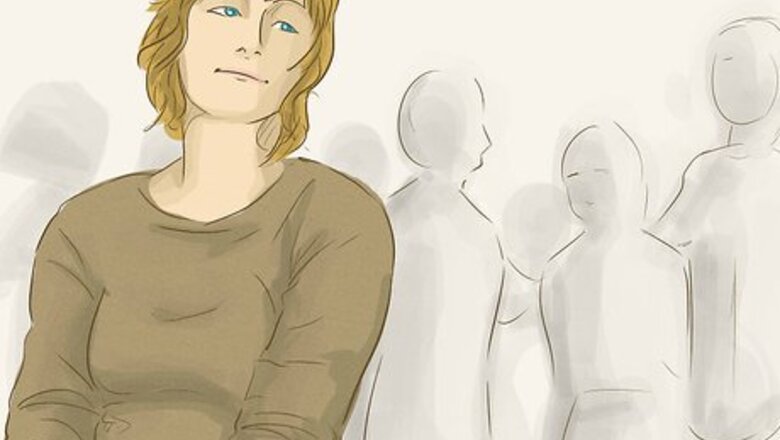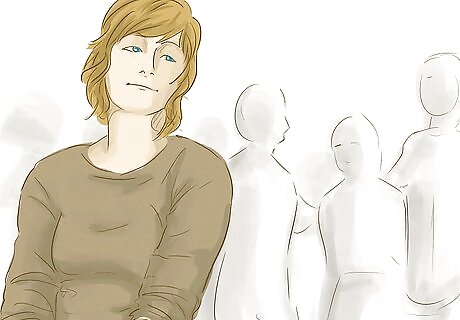
views
X
Research source
Inappropriate Laughter

Observe other people. Watching how other people act in social situations can give you a better idea of how you are expected to act, and what types of behavior or reactions are considered appropriate in those situations. Sometimes it's better, particularly if you are in a new environment, to stay on the edge and observe before jumping in and interacting with people yourself. Observation doesn't just extend to immediate situations. Watching movies and television shows can help you understand when laughter is appropriate.

Mimic how you see others acting in the situation. This can be a shortcut if you are in a new situation that you've truly never experienced. Try to copy the facial expressions and responses of the people you see. However, you want to make sure the people you choose to mimic are acting appropriately. It may take some time observing from the outside to identify whose behavior you should copy. If you know you will be in a place where you won't know many people, consider bringing a friend along who can help you evaluate the situation and identify the people you should mimic.

Talk to friends or family members. People who are close to you and who spend a lot of time with you may be able to provide you with examples of situations in which you were laughing inappropriately. This information can help you develop your own rules. Being self-aware is a big part of controlling your laughter. You can't control something if you don't realize you're doing it – or if you don't realize that the behavior is inappropriate and should be controlled. Friends and loved ones who you trust can be good sources to point out situations in which your laughter was inappropriate. They may even be able to find photos or videos of you in which the behavior is present. When you look at photos or videos, you can identify how your response was different from that of the people around you. Look at your face and your body compared to the others to recognize these differences.

Ask your friends or family members to help you if you get into a situation where you are laughing inappropriately. You can create a secret sign or signal they can give to you to indicate that you should stop and look around you because you are not acting appropriately. For example, you might tell your friend to squeeze your hand when you're out together if someone says something that causes you to laugh inappropriately. Having someone you know with you can also ease your anxiety, which can make it easier to control your laughter. If you're in an environment, such as a job interview, where you can't have someone with you, try to imagine that person is with you and think about what they would say or do in the situation.

Categorize social situations. In some social situations, laughter is seldom (if ever) appropriate. Label situations such as funerals or emergencies as "no laughter" situations. Set them off in your mind from other situations, such as parties or comedy performances, in which laughter is not only accepted but encouraged. Labeling emotions and identifying when particular emotional expressions are appropriate can be difficult for autistic people. However, thinking about them rationally and creating categories can give you rules to apply to social situations and interactions with others. Many autistic people work well with categories and patterns that lay out specific rules they can follow in social situations. Etiquette books can help familiarize you with basic social rules, and typically present those rules in a relatively straightforward manner that you can understand and apply to your own life.

Think about why you're laughing. There may be many reasons you're laughing that have nothing to do with whatever is going on around you. Many people laugh when they are nervous, anxious, or frightened. You may not have time to analyze your behavior in the moment, so this is something best done after the fact. You can then use what you learn to help you in similar situations in the future. For example, suppose a friend highlighted a moment in which you laughed inappropriately in response to a question you were asked by a stranger at an important school event. Thinking back, you realize that you were extremely nervous during that event because there were a lot of people there who you didn't know, and you were anxious to make a good impression.

Research situations ahead of time. You may be able to alleviate nervousness by learning as much as you can about an event before it happens, such as looking into the background of the people who will be attending. Look up the location online and find pictures of where you will be. If you're going to someone's house, ask mutual friends if they have any photos of the location they can share with you. Find facts or information that interest you about the event or the location. These can also help you interact with those around you and start productive and meaningful conversations. Learning all you can about the people who are going to be there means you are more familiar with those people and the things in which they're interested.

Remedy the source of your laughter. To control your laughter, you must address the root cause of the laughter. In many cases, especially if you are laughing because you are nervous or anxious in a social situation, this may be easier said than done. Often, controlling your laughter means you must be able to pinpoint situations in which inappropriate laughter might be a problem ahead of time. Do what you need to do beforehand to ease your anxiety or discomfort in the situation so you will be less prone to nervous laughter. For example, if you have a job interview, read possible interview questions and have responses prepared. Bring along a fidget or stim toy (you can hide it in your purse or pocket) to help you cope with nervousness.

Don't obsess over your laughter. It's good to behave thoughtfully and compassionately—but it isn't good to be spending the whole time concentrating on what you're "supposed" to do and missing out on the ability to be fully present and have fun. It is possible to analyze yourself too much. Take some deep breaths, and allow yourself to engage in the conversation. Ask your family or loved ones if they think you are overthinking the "inappropriate laughter" problem. It may be that no one else is bothered by your laughter. Don't let social fears keep you from engaging with other people or having fun.
Medical Causes

Try a gluten-free diet. Some autistic people are sensitive to gluten, a substance in wheat that can be found in many staple foods such as bread. Gluten sensitivities can sometimes trigger an inappropriate laughter response. To see if gluten sensitivities may be negatively impacting your behavior, make a decision to go gluten-free for a month. During that time, you should avoid making any other significant changes to your life or diet. This enables you to get an accurate picture of whether any difference you see actually is attributable to your gluten-free diet. If you make too many changes at once, you won't be able to isolate which specific changes were helpful and which weren't. You can find gluten-free products in the grocery store, or substitute bread and wheat products in your diet with naturally gluten-free foods such as rice, beans, and potatoes. Keep in mind that you may find your behavior (and your ability to control it) gets worse before it gets better. Be willing to stick it out for several weeks before you make a decision about whether to go gluten-free for life.

Eliminate dairy products from your diet. Casein is a substance in all dairy products. Some autistic people are sensitive or allergic to this substance. If you have casein sensitivities, it may be affecting you neurologically – including causing inappropriate laughter. As with making the switch to a gluten-free diet, your decision to go dairy-free should be an isolated experience. Don't change anything else about your diet while you're trying a dairy-free diet. Be sure to check the ingredient panels on the boxes of any prepared foods you buy for dairy ingredients. Eliminating dairy from your diet often isn't as simple as not eating milk and cheese. For example, many casseroles and other prepared foods include butter and milk. Many people also use butter to cook various meats or vegetables. Try your dairy-free diet for at least a month or so and examine your body and behavior carefully for changes. Remember that dietary changes are not a cure-all. Just because they help some autistic people doesn't mean they'll do anything for you. If you don't notice any difference in your behavior on a dairy-free diet, it may not be necessary to continue and make it a part of your regular life.

Limit your intake of sugar. Everyone could benefit from diets that were lower in sugar – particularly in the United States. Americans consume significantly more sugar than in other countries, and a sugar "high" can lead to inappropriate laughter. Like many food substances or additives, sugar is something best consumed in moderation. However, sugar is added to many foods, especially processed foods. Limiting your sugar intake means reviewing ingredient lists very carefully and understanding the different types of substances, such as corn syrup, that actually are just sugar in disguise. Keep in mind that you may find sugar, particularly high-fructose corn syrups, in products that you wouldn't necessarily consider "sweet," such as frozen foods and prepared sauces or salad dressings.

Try adding supplements. Your diet may be deficient in particular nutrients that are causing your body to have a biomedical reaction. Ensuring your body gets the nutrients you need can help stabilize your system generally, allowing you to control inappropriate emotional reactions more easily. For example, most American diets are deficient in Omega 3. You can add this nutrient to your diet by taking fish oil supplements. These supplements may affect your behavior dramatically, or not at all. Everyone is different, and something that works for another person – even another autistic person – will not necessarily work for you. As with other dietary changes, add supplements one at a time. Use them for a while and monitor your results. If you notice no change in your body or your behavior, you may decide you want to discontinue the supplement.
Learning Empathy

Put yourself in the other person's shoes. If you're autistic, it can be particularly difficult to understand someone else's emotions or perception as distinct from what's going on in your own mind. Imagining yourself in their place can help you understand how they feel. For example, suppose you witness a bully pushing someone down on the sidewalk. The bully's friends laugh at the person on the ground, but the people around you react with horror. Your first impulse may be to laugh, because you hear other people laughing. However, laughing puts you on the side of the bully. By imagining that you are the person who got pushed down, you can understand why the situation isn't something that should be laughed at.

Think of times when you were hurt or upset. Relating someone else's experience to a time when you were in a similar situation, or when you were hurt yourself, can help you empathize with them and avoid laughing in an inappropriate situation. It isn't necessary to have been in the exact same situation as the person who is experiencing pain or sadness. Try to find a situation in which you felt similarly, even if it is related to their experience. For example, suppose a friend tells you that their brother has died. If you've never experienced the loss of a sibling, you might think you can't possibly understand how they feel. However, you may have experienced the loss of another beloved family member. Even though your feelings about that person may not have been exactly the same as your friend's feelings for their brother, it can help you relate and understand what they're going through. Focus on their feelings rather than your feelings. For example, if you didn't like their brother or if he was cruel to you, it may be difficult to feel sad at his passing. But your friend loved him, and it's your friends feelings that should drive your response.

Break down large, complex situations into smaller components. Breaking down someone's feelings can help you find situations you have experienced in which you felt similarly. By putting those components together, you can react to their news more appropriately. For example, suppose a friend tells you that she is sad because her older sister went away to school. This is a complex situation because your friend is likely feeling many things at once. Although she is sad because she knows she'll miss her sister's companionship, she also is likely excited for her sister to be starting a new chapter in her life. Think about a time when someone you loved or cared about moved away. They were still around, but you didn't get to see them as often and you missed their companionship. Now think about a time when you were excited and proud for someone else. Maybe your mother got a promotion at work or your brother made the soccer team. If you put those feelings together, you can empathize with what your friend is going through with her sister.

View a situation from all sides. Many situations that are funny also have an unfunny side to them. If you look at all aspects of a situation, you can focus on the unfunny side to help control your laughter. For example, many people like to laugh at the exploits of celebrities. These famous people are often in the news, and frequently do things that seem ridiculous or unwise. It's tempting to laugh at the failures of celebrities because their lives seem so beautiful and easy. They have lots of money, fancy cars and homes, and go on fabulous vacations. However, they also are hounded by photographers daily. They may have very little privacy, with everything they do under a microscope. People constantly look for reasons to judge or condemn them. Many celebrities react poorly to this tension, and may develop serious mental health conditions or addictions to dangerous drugs or alcohol. Understanding this other side of celebrity news can help you control your impulse to laugh when you hear stories of a celebrity's mistakes or bad behavior. This is empathy. You have no idea what it's like to be a celebrity, but you can imagine how it would feel to have no privacy and feel like your every action was being judged or criticized.

Use scripts to focus your behavior. Social scripts help many autistic people determine how they should act and what they should say in various social situations. If scripts work for you, you can use them to help control your laughter. If you stick to your script, you can avoid uncomfortable situations. You won't feel as nervous as you might otherwise, because you know you can follow your script to act appropriately. For example, you might prepare for a job interview by reading common interview questions and scripting your response to those questions. You can even write down your answers if it will help you to memorize them. Once you're in the situation, you'll be less inclined to laugh because you'll be listening for a question that you can answer using a scripted response. If the interviewer asks a question for which you're not prepared, take a moment to think about it, and break it down into smaller parts. Use this understanding to answer the question, perhaps by using a portion of a scripted answer or relating the question to one you've already practiced.

Apologize and explain. An apology and a cover story may be part of your general social scripting. These can help smooth a situation when you find yourself laughing inappropriately or unable to control your laughter. For example, you might say "I'm sorry. I know what you said wasn't funny, and I wasn't laughing at you. I was laughing because I just thought of something I saw on television earlier." Then you can tell the joke or funny scene you saw, and let everyone else in on the joke. You may find that people are then laughing with you rather than judging you for laughing inappropriately. In other situations telling a joke isn't appropriate at all. It can help to say "Sorry. Sometimes I laugh when I'm nervous or confused" and move on.

Regulate your responses in unfamiliar situations. If you're in a situation that you can't immediately relate to anything else you've experienced before, you must rely on your own powers of self-control. While you don't want to hurt or injure yourself, biting your lip or the inside of your cheek and bring an abrupt halt to inappropriate laughter. You also might try pinching yourself. If you find that you absolutely cannot stop laughing, no matter what you do, the most appropriate response is to quickly remove yourself from the situation. For example, you might pretend you are coughing, then excuse yourself to the restroom. Get away from the other people and get the laughter out of your system before you return. When you do return, apologize for your response. Asking a question can indicate that you really do care about what was happening and the other person's feelings.














Comments
0 comment